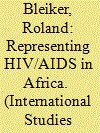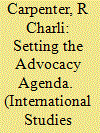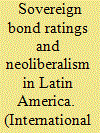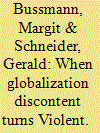|
|
|
Sort Order |
|
|
|
Items / Page
|
|
|
|
|
|
|
| Srl | Item |
| 1 |
ID:
076505


|
|
|
|
|
| Summary/Abstract |
Do the institutions and practices of the major powers influence those of other states? Many international relations theorists have argued that these powerful states' prestige allows them to define what is normatively acceptable. This paper tests the influence of the internal characteristics of major powers on democratization, the extension of formal political equality to women, and the practice of jailing or killing the state's domestic political opponents. We find support for the major power prestige hypothesis in the latter two cases. In understanding some important international outcomes, it makes sense to treat major powers less like impenetrable "billiard balls," distinguished only by their relative power, and more like "snowflakes" with many relevant internal characteristics
|
|
|
|
|
|
|
|
|
|
|
|
|
|
|
|
| 2 |
ID:
076506


|
|
|
|
|
| Publication |
2007.
|
| Summary/Abstract |
Recent research suggests that cultural differences in Chinese and Western modes of conceptual reasoning play a significant role in political discourse and relations between the United States and China. In contrast, our analysis of the discourse surrounding the 2001 collision of an American surveillance plane with a Chinese fighter jet over international waters reveals a surprisingly high degree of similarity in conceptual metaphors used across the two cultures. Using tools from cognitive linguistics and cognitive science, we compare U.S. and Chinese conceptual metaphors used to frame the incident over a 13-day period, ultimately distinguishing between shared metaphorical conceptualizations (War, Journey, and Economic) and competing metaphorical conceptualizations (Game, Technical Fix, Victim, and Civil Relations). Our analysis allows us to make empirically grounded claims about Chinese-American relations that avoid cultural stereotypes and suggest possibilities for further integration of interpretive and scientific approaches for understanding intercultural discourse.
|
|
|
|
|
|
|
|
|
|
|
|
|
|
|
|
| 3 |
ID:
076511


|
|
|
|
|
| Publication |
2007.
|
| Summary/Abstract |
This essay explores the nature and political consequences of representing HIV/AIDS in Africa, where the disease has taken its greatest toll. We examine how different methods of photography embody different ideologies through which we give meaning to political phenomena. We distinguish three photographic methods of representing HIV/AIDS: naturalist, humanist, and pluralist. Naturalist approaches portray photographs as neutral and value free. Humanist photography, by contrast, hinges on the assumption that images of suffering can invoke compassion in viewers, and that this compassion can become a catalyst for positive change. By examining a widely circulated iconic photograph of a Ugandan woman and her child affected by AIDS-related illnesses, we show that such representations can nevertheless feed into stereotypical portrayals of African people as nameless and passive victims, removed from the everyday realities of the western world. We contrast these practices with pluralist photography. To do so we examine a project in Addis Ababa, which used a methodology that placed cameras into the hands of children affected by HIV/AIDS, giving them the opportunity to actively represent what it means to live with the disease. The result is a form of dialog that opens up spaces for individuals and communities to work more effectively in overcoming problematic stigmas and finding ways of stemming the spread of the disease.
|
|
|
|
|
|
|
|
|
|
|
|
|
|
|
|
| 4 |
ID:
076508


|
|
|
| 5 |
ID:
076509


|
|
|
|
|
| Publication |
2007.
|
| Summary/Abstract |
The importance of credit rating agencies (CRAs) in rating sovereign bonds has grown as developing countries increasingly issue bonds to attract foreign capital. Although in their methodologies CRAs claim that the initiation of neoliberal reforms influences bond ratings, given the secrecy surrounding ratings, it is unclear what impact reforms actually have on CRAs. Controlling for macroeconomic and political determinants, we use statistical analyses, as well as recent qualitative evidence, for some 16 Latin American countries from 1992 to 2003 to assess the effects of economic reforms on CRA decisions. We find that among neoliberal policies only trade liberalization positively and consistently impacts bond ratings. The relative ease of implementation along with the credible commitment to maintain trade policies help explain higher bond ratings. The results also show that inflation and bond defaults negatively affect CRA assessments. The findings provide reasons for optimism. Many economic policies, often politically difficult to implement, do not lead to higher ratings. Others that are relatively easy to implement do. Policy makers in Latin American countries have more options to lessen political tensions, lower the cost of capital, and increase its availability for investment and growth than previously predicted.
|
|
|
|
|
|
|
|
|
|
|
|
|
|
|
|
| 6 |
ID:
076504


|
|
|
| 7 |
ID:
076515


|
|
|
|
|
| Publication |
2007.
|
| Summary/Abstract |
Inferences about counterfactuals are essential for prediction, answering "what if" questions, and estimating causal effects. However, when the counterfactuals posed are too far from the data at hand, conclusions drawn from well-specified statistical analyses become based on speculation and convenient but indefensible model assumptions rather than empirical evidence. Unfortunately, standard statistical approaches assume the veracity of the model rather than revealing the degree of model-dependence, so this problem can be hard to detect. We develop easy-to-apply methods to evaluate counterfactuals that do not require sensitivity testing over specified classes of models. If an analysis fails the tests we offer, then we know that substantive results are sensitive to at least some modeling choices that are not based on empirical evidence. We use these methods to evaluate the extensive scholarly literatures on the effects of changes in the degree of democracy in a country (on any dependent variable) and separate analyses of the effects of UN peacebuilding efforts. We find evidence that many scholars are inadvertently drawing conclusions based more on modeling hypotheses than on evidence in the data. For some research questions, history contains insufficient information to be our guide. Free software that accompanies this paper implements all our suggestions.
|
|
|
|
|
|
|
|
|
|
|
|
|
|
|
|
| 8 |
ID:
076512


|
|
|
| 9 |
ID:
076507


|
|
|
|
|
| Publication |
2007.
|
| Summary/Abstract |
One of the disputed consequences of global economic integration is the possible effect that foreign economic liberalization exerts on social cohesion. Proponents of commercial liberalism see stabilization as an indirect consequence of growing economic interdependence, while globalization critics are much more skeptical. They expect, at least during the liberalization process, destabilizing effects. We examine in this paper the contradictory claims in the light of what we call the distributional theory of civil war. This variant of commercial liberalism qualifies the peace-through-trade hypothesis and expects, based on political economy models of trade policy making, that the redistributive struggle associated with foreign economic liberalization can culminate in violent forms of protest. We demonstrate that a higher level of economic openness is indeed associated with a lower risk of civil war. At the same time, economic liberalization increases the chances of instability weakly. None of the following factors are found to exert any compensatory influence on instability: social spending, foreign aid, and financial flows from the International Monetary Fund. Discontent over the process of globalization is thus a destabilizing force despite the pacifying effect that the level of economic integration exerts.
|
|
|
|
|
|
|
|
|
|
|
|
|
|
|
|
|
|
|
|
|